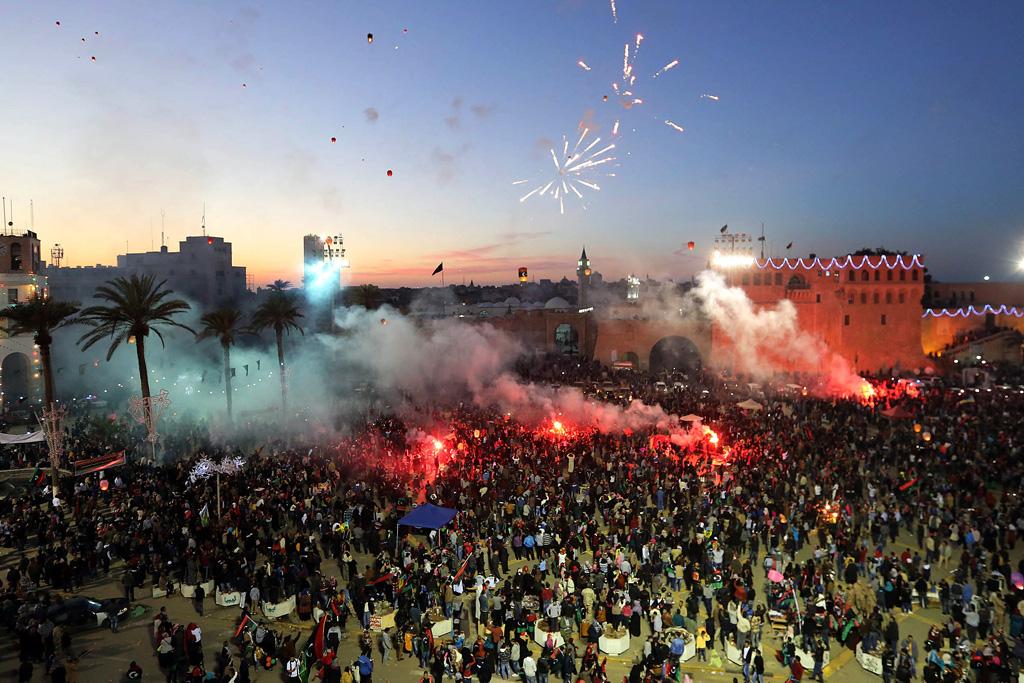Nearly two years after liberation, Libya at a crossroads
Thousands of Libyans celebrate the second anniversary of the Libyan uprising at Martyrs square on February 17, 2013 in Tripoli. The anniversary of the uprising that ended with Muammar Gaddafi’s killing in October 2011 comes as Libya’s new rulers battle critics calling for a “new revolution” and accusing them of failing to usher in much-needed reforms.
EDITOR'S NOTE: William Wheeler, recipient of the first annual GroundTruth reporting fellowship in the Middle East, is now on assignment in Libya. Today he begins a series of guest posts for this blog and will soon be filing a GlobalPost Special Report on Libya's struggle to forge a democracy in the smoldering aftermath of the Arab Spring. As a journalist with a good ear for the Arab street, Wheeler was chosen for the $10,000 reporting grant in large part because he embodies the spirit of 'ground truth' and the attributes of some of its greatest adherents, including the New York Times' Anthony Shadid, who died on assignment in Syria, and the American reporter for the Sunday Times of London, Marie Colvin, who was killed in a rocket attack in Syria. Like Shadid and Colvin, Wheeler is all about being there on the ground and taking the measure of a big and complex story in simple, human terms. The GroundTruth reporting fellowship is funded by the Correspondents Fund.
TRIPOLI, Libya — A few days ago I returned to Tripoli to find what is, in many ways, a very different city than the one I last saw in the weeks after its liberation. On the surface, things look better. Some hotels and cafes have new facades, testament to a brief flush of renewed investment. The sidewalks are thick with vendors, and their tarps stretch overhead like a canopy on some streets, so tightly packed I had trouble at first recognizing familiar sights. You no longer see rebels firing into the air on every street corner. Or families celebrating in Martyr’s Square.
But neither has life returned to normal. Over the last month, in Benghazi, a series of car bomb attacks struck empty police stations, and what may have been an accidental explosion killed three people; in Tripoli, another car bomb hit the French Embassy, injuring two guards and prompting a withdrawal of some foreign embassies’ personnel amid fears the Libyan government is losing its grip on the capital, and militias besieged government ministries, pressuring lawmakers to approve legislation banning those who had worked for the regime from positions in the new government. All in all, it gives the impression, as a jewelry store clerk put it, that “things are getting dangerous again.”
Libya has held together remarkably well given its circumstances (not least of which, the decades Gaddafi spent undermining the social and bureaucratic structures that are the organs of a functioning society). And there are still grounds for hope that a stronger country will emerge from this difficult stage of democracy.
But for now, the political landscape is complex, murky and fluid; speculation about who is behind the recent attacks only adds to an already thriving culture of conspiracy theories. Perhaps worst of all, the insecurity seems to have scared off foreign investors, compounding a major problem the countries of the Arab Awakening have in common: unemployment.
Security is at the root of Libya’s most immediate challenges, an issue that I will be looking at over the next few weeks.
It’s a cliché to say the country is at a crossroads. But it’s true. You don’t have to look far to get a sense of how combustible the situation is. Last Wednesday, a botched raid by a security force made up of former rebels touched off a massive battle in the neighborhood of Gargaresh, home to a thriving black market alcohol business (alcohol is illegal in Libya, and a bad batch of moonshine from one dealer in the neighborhood recently killed more than 100 people and hospitalized hundreds more). The gunfight left several dead or wounded by the time security forces finally withdrew. When they returned the next day, furious residents sealed off the neighborhood with gunfire, burning tires and Molotov cocktails.
On Saturday, the streets were still littered with broken glass, debris, and tire ash. A haze of white smoke billowed from trash fires. A police office, which the new government had repaired since the revolution but not yet reopened, was tagged with fresh graffiti: “Fuck You [in English] Counter Crime Division [in Arabic];” and a statement that translates roughly as “Gargaresh is ice cold.” Two teenage boys sat on the front steps of a radio station that residents had torched, declining to comment. The neighborhood sentiment seems to be, as one anonymous source told the Libya Herald, “we don’t need media — we need security.”
Several people said that some residents had threatened to seal of the neighborhood again if security forces did not hand over the rebel who had killed a local man. On Sunday, masked gunmen began firing weapons and blocking off the streets again with rubbish, seemingly making good on that promise.
But, within Gargaresh, blame for the chaos appears to be directed at unruly security forces. One shop clerk told me that the former rebels’ unit, the “Counter Crime Division,” has come into the neighborhood several times, threatening residents and even looting homes. “They came and put RPGs in our faces,” he said. “They’re not professional. They’re terrorizing people… We need real police. Not thieves who come here and steal.”
We want to hear your feedback so we can keep improving our website, theworld.org. Please fill out this quick survey and let us know your thoughts (your answers will be anonymous). Thanks for your time!
